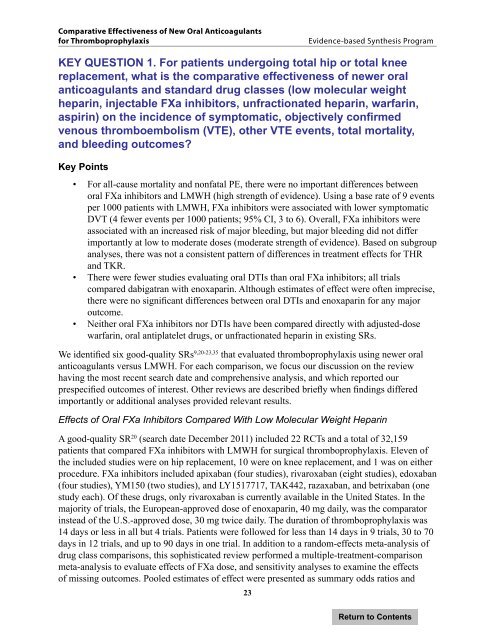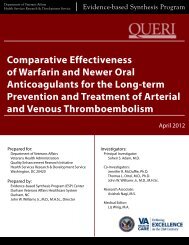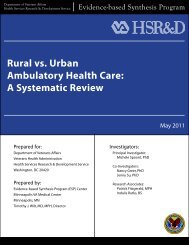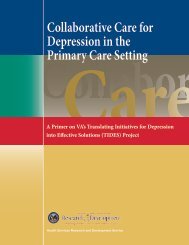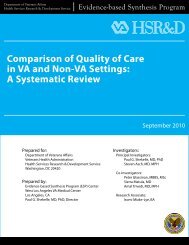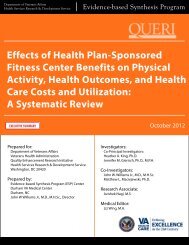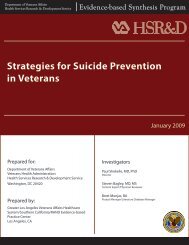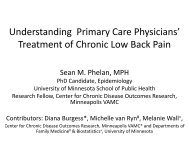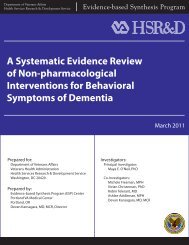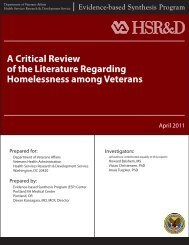Comparative Effectiveness of New Oral Anticoagulants for ...
Comparative Effectiveness of New Oral Anticoagulants for ...
Comparative Effectiveness of New Oral Anticoagulants for ...
Create successful ePaper yourself
Turn your PDF publications into a flip-book with our unique Google optimized e-Paper software.
<strong>Comparative</strong> <strong>Effectiveness</strong> <strong>of</strong> <strong>New</strong> <strong>Oral</strong> <strong>Anticoagulants</strong><br />
<strong>for</strong> Thromboprophylaxis<br />
Evidence-based Synthesis Program<br />
KEY QUESTION 1. For patients undergoing total hip or total knee<br />
replacement, what is the comparative effectiveness <strong>of</strong> newer oral<br />
anticoagulants and standard drug classes (low molecular weight<br />
heparin, injectable FXa inhibitors, unfractionated heparin, warfarin,<br />
aspirin) on the incidence <strong>of</strong> symptomatic, objectively confirmed<br />
venous thromboembolism (VTE), other VTE events, total mortality,<br />
and bleeding outcomes?<br />
Key Points<br />
• For all-cause mortality and nonfatal PE, there were no important differences between<br />
oral FXa inhibitors and LMWH (high strength <strong>of</strong> evidence). Using a base rate <strong>of</strong> 9 events<br />
per 1000 patients with LMWH, FXa inhibitors were associated with lower symptomatic<br />
DVT (4 fewer events per 1000 patients; 95% CI, 3 to 6). Overall, FXa inhibitors were<br />
associated with an increased risk <strong>of</strong> major bleeding, but major bleeding did not differ<br />
importantly at low to moderate doses (moderate strength <strong>of</strong> evidence). Based on subgroup<br />
analyses, there was not a consistent pattern <strong>of</strong> differences in treatment effects <strong>for</strong> THR<br />
and TKR.<br />
• There were fewer studies evaluating oral DTIs than oral FXa inhibitors; all trials<br />
compared dabigatran with enoxaparin. Although estimates <strong>of</strong> effect were <strong>of</strong>ten imprecise,<br />
there were no significant differences between oral DTIs and enoxaparin <strong>for</strong> any major<br />
outcome.<br />
• Neither oral FXa inhibitors nor DTIs have been compared directly with adjusted-dose<br />
warfarin, oral antiplatelet drugs, or unfractionated heparin in existing SRs.<br />
We identified six good-quality SRs 9,20-23,35 that evaluated thromboprophylaxis using newer oral<br />
anticoagulants versus LMWH. For each comparison, we focus our discussion on the review<br />
having the most recent search date and comprehensive analysis, and which reported our<br />
prespecified outcomes <strong>of</strong> interest. Other reviews are described briefly when findings differed<br />
importantly or additional analyses provided relevant results.<br />
Effects <strong>of</strong> <strong>Oral</strong> FXa Inhibitors Compared With Low Molecular Weight Heparin<br />
A good-quality SR 20 (search date December 2011) included 22 RCTs and a total <strong>of</strong> 32,159<br />
patients that compared FXa inhibitors with LMWH <strong>for</strong> surgical thromboprophylaxis. Eleven <strong>of</strong><br />
the included studies were on hip replacement, 10 were on knee replacement, and 1 was on either<br />
procedure. FXa inhibitors included apixaban (four studies), rivaroxaban (eight studies), edoxaban<br />
(four studies), YM150 (two studies), and LY1517717, TAK442, razaxaban, and betrixaban (one<br />
study each). Of these drugs, only rivaroxaban is currently available in the United States. In the<br />
majority <strong>of</strong> trials, the European-approved dose <strong>of</strong> enoxaparin, 40 mg daily, was the comparator<br />
instead <strong>of</strong> the U.S.-approved dose, 30 mg twice daily. The duration <strong>of</strong> thromboprophylaxis was<br />
14 days or less in all but 4 trials. Patients were followed <strong>for</strong> less than 14 days in 9 trials, 30 to 70<br />
days in 12 trials, and up to 90 days in one trial. In addition to a random-effects meta-analysis <strong>of</strong><br />
drug class comparisons, this sophisticated review per<strong>for</strong>med a multiple-treatment-comparison<br />
meta-analysis to evaluate effects <strong>of</strong> FXa dose, and sensitivity analyses to examine the effects<br />
<strong>of</strong> missing outcomes. Pooled estimates <strong>of</strong> effect were presented as summary odds ratios and<br />
23


